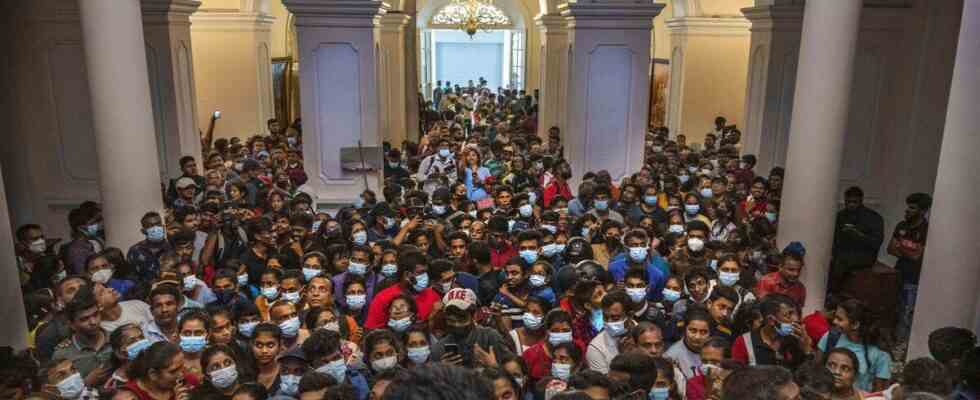Sri Lanka is facing one of the most violent crises in its history, since its independence in 1948. Inflation soared to 54.6% in June, strangling the population who also faced food shortages, fuel and electricity. Since the end of March, demonstrations have been organized in the country to demand the resignation of the president and the government. From inflation to desertion, “20 Minutes” looks back on the crisis that is shaking Sri Lanka.
Why did the situation explode?
Protesters have camped outside the Presidential Secretariat for more than three months demanding the president’s resignation. Gotabaya Rajapaksa is accused of mismanaging the economy. Sri Lanka is unable, for lack of foreign exchange, to finance the most essential imports for the population of 22 million inhabitants. In two years in power, the president has emptied the state coffers which have gone from 7.5 billion dollars to 2.7 billion dollars at the end of 2021.
Colombo defaulted on its $51 billion foreign debt in April and is in talks with the International Monetary Fund (IMF) for a possible bailout. Sri Lanka has almost exhausted its gasoline reserves. The government has ordered the closure of non-essential offices and schools to reduce travel and save fuel. In six months, the price of diesel has exploded by 230%, that of gasoline by 137%.
In addition, the Covid-19 has aggravated the situation. Normally, tourism accounts for 10% of the economy of the island, located in southeastern India. And visitors were already scarce after the wave of attacks that hit the country in the spring of 2019. Now, the inhabitants are so impoverished that 80% of them skip meals, according to the UN.
What turn did the crisis take this weekend?
On Saturday, hundreds of thousands of people had gathered in the area of the official residences to express their anger. Several hundred managed to break into the palace, scaling the gates as guards struggled to hold them off just long enough to exfiltrate the president.
The Prime Minister’s residence was set on fire in the evening, and three suspects were arrested on Sunday, according to the police. These events are the culmination of the incessant and sometimes violent protests of recent months in the face of shortages. Residents blame the Rajapaksa clan, brothers who shared power for more than fifteen years, and accuse them of incompetence and corruption.
Occupying not only the presidential palace but also that of the Prime Minister, and the offices of these two leaders, the protesters obtained a promise of resignation from the head of state which should occur on July 13.
Where is the disputed president?
In the meantime, Gotabaya Rajapaksa is desperately trying to leave the country. On Tuesday, the leader found himself stranded at Colombo airport after a humiliating face-to-face with immigration officials who turned him back. Having not yet resigned, which he promised to do on Wednesday for a “peaceful transition of power”, he enjoys presidential immunity. He might want to take the opportunity to find refuge abroad.
According to a senior defense source, advisers to Gotabaya Rajapaksa are discussing an escape by the president and his entourage aboard a patrol vessel. The office of the presidency does not communicate on his situation, but Gotabaya Rajapaksa remains the commander-in-chief of the armies, thus having military means.
A navy vessel had already used to transfer the head of state on Saturday from the presidential palace besieged by protesters to the port of Trincomalee in the northeast of the country. Then, the Head of State joined Colombo International Airport by helicopter on Monday. “The best option now is to get out by sea,” the defense official said. “He could go to the Maldives or India and fly to Dubai.” Another option, the source added, would be to charter a flight from Mattala International Airport. In any case, behind the scenes, the escape of the contested president is being organized.
Who to replace the future exile?
If the head of state resigns as promised, Prime Minister Ranil Wickremesinghe will automatically be appointed interim president, but he is also contested by the demonstrators. Parliament will then have one month to elect a deputy who will exercise power until the end of the current mandate, that is to say November 2024.
A very long time given the crisis. The President of Parliament also assured that the deputies would appoint the new president within a week. But no candidate seems to have gathered a majority of votes for the moment and the political crisis could continue.

